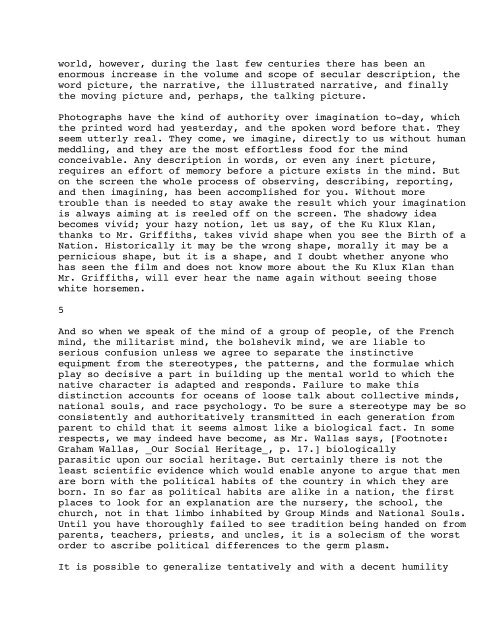PUBLIC OPINION by WALTER LIPPMANN TO FAYE LIPPMANN ...
PUBLIC OPINION by WALTER LIPPMANN TO FAYE LIPPMANN ...
PUBLIC OPINION by WALTER LIPPMANN TO FAYE LIPPMANN ...
Create successful ePaper yourself
Turn your PDF publications into a flip-book with our unique Google optimized e-Paper software.
world, however, during the last few centuries there has been an<br />
enormous increase in the volume and scope of secular description, the<br />
word picture, the narrative, the illustrated narrative, and finally<br />
the moving picture and, perhaps, the talking picture.<br />
Photographs have the kind of authority over imagination to-day, which<br />
the printed word had yesterday, and the spoken word before that. They<br />
seem utterly real. They come, we imagine, directly to us without human<br />
meddling, and they are the most effortless food for the mind<br />
conceivable. Any description in words, or even any inert picture,<br />
requires an effort of memory before a picture exists in the mind. But<br />
on the screen the whole process of observing, describing, reporting,<br />
and then imagining, has been accomplished for you. Without more<br />
trouble than is needed to stay awake the result which your imagination<br />
is always aiming at is reeled off on the screen. The shadowy idea<br />
becomes vivid; your hazy notion, let us say, of the Ku Klux Klan,<br />
thanks to Mr. Griffiths, takes vivid shape when you see the Birth of a<br />
Nation. Historically it may be the wrong shape, morally it may be a<br />
pernicious shape, but it is a shape, and I doubt whether anyone who<br />
has seen the film and does not know more about the Ku Klux Klan than<br />
Mr. Griffiths, will ever hear the name again without seeing those<br />
white horsemen.<br />
5<br />
And so when we speak of the mind of a group of people, of the French<br />
mind, the militarist mind, the bolshevik mind, we are liable to<br />
serious confusion unless we agree to separate the instinctive<br />
equipment from the stereotypes, the patterns, and the formulae which<br />
play so decisive a part in building up the mental world to which the<br />
native character is adapted and responds. Failure to make this<br />
distinction accounts for oceans of loose talk about collective minds,<br />
national souls, and race psychology. To be sure a stereotype may be so<br />
consistently and authoritatively transmitted in each generation from<br />
parent to child that it seems almost like a biological fact. In some<br />
respects, we may indeed have become, as Mr. Wallas says, [Footnote:<br />
Graham Wallas, _Our Social Heritage_, p. 17.] biologically<br />
parasitic upon our social heritage. But certainly there is not the<br />
least scientific evidence which would enable anyone to argue that men<br />
are born with the political habits of the country in which they are<br />
born. In so far as political habits are alike in a nation, the first<br />
places to look for an explanation are the nursery, the school, the<br />
church, not in that limbo inhabited <strong>by</strong> Group Minds and National Souls.<br />
Until you have thoroughly failed to see tradition being handed on from<br />
parents, teachers, priests, and uncles, it is a solecism of the worst<br />
order to ascribe political differences to the germ plasm.<br />
It is possible to generalize tentatively and with a decent humility





